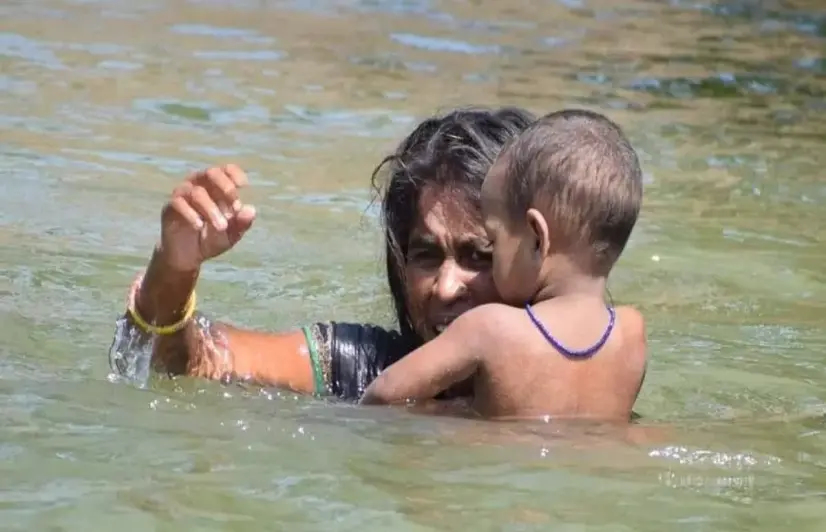Lack of sanitation a major concern for women in flood-affected Bihar

Lack of sanitation a major concern for women in flood-affected Bihar
For women and young girls, the absence of proper toilets and menstrual hygiene products pose several safety threats as flood waters overtake their lands and homes.
Muzaffarpur: For women like Shobha Rani, Kusum Rani and Kalavati, the tragedy of floods in their region — the Akharaghat area of Muzaffarpur, Bihar — is nothing new. As a low lying and densely populated place, water-logging in the Burhi Gandak river results in dangerous flooding in the region every year.
The problem is even more dire in the urban slums, where most people live below the poverty line. "Despite the flooding, it is impossible to go anywhere because this is our home," said Shobha Rani (65). She seemed resigned to her fate like many others in Bihar, which witnessed massive floods this year as well.
In the state's Muzaffarpur district, rural areas like Marwan, Sahebganj, Mushahari, Paroo, Aurai, Katra, Narauli, Kanti, Bochahan, Kurhani, Minapur, Sakra, Muraul and Motipur had all been submerged due to increasing water levels in Burhi Gandak river and the terrible condition of the drains. Several people had filed complaints demanding that they be cleaned, but their voices had so far remained ignored.
As a result of the floods, thousands of people had been displaced. Some sought shelter under a tarp on the highway, while others had gone to the top floors or roofs of their homes, awaiting help.
Chandni Devi from Chhoti Parbatta village told 101Reporters that camps had been set up in the flood-affected areas, either by NGOs or local good Samaritans. The women, worried about their hungry children, walked submerged in water to get food — risking snake bites and infections.
''We stand in line for hours, but there is no guarantee of getting food. This is the situation in many camps, as most people cannot avail relief funds [either because most are not aware of the process or were fatigued by the bureaucratic hoops they had to jump through]. We usually leave our children at home, but we're constantly scared about them falling from the height,'' she added.
In the absence of concrete government measures, several NGOs and civil societies had come to help people, providing them with necessities such as food, water, and medicines. However, some basic needs continue to be unmet.

A young girl wades through flood waters to collect food aid from the camp (Picture credit - Madhav)
Lack of sanitation
Flood victims, more often than not, lost access to toilets and sanitation. While men could manage with temporary measures, for women the lack of sanitation posed several challenges such as safety concerns and risk of infections due to the lack of proper medical care.
Sunaina Devi, Rajkumari Devi and Parvati Devi, residents of Sohansi of Chandkewari panchayat under Paroo block, echoed this predicament. They felt especially ashamed in case of infections when they were compelled to defecate twice or thrice a day, often in broad daylight. ''We have to sit on an open dam to defecate. And these issues become all the more dire during menstruation,'' they told 101Reporters.
Most of these women re-use a cloth in lieu of a sanitary pad during menstruation. However, in the absence of toilets and clean water, they have to wash the fabric with dirty water, which increases the risk of some major diseases and infections.
Anu Kumari, a local senior Auxiliary Nurse Midwife (ANM) from the Government Sadar Hospital in Muzaffarpur, said that ''due to lack of proper sanitation, women in flood-affected areas are at high risk of urinary tract infections or UTIs. Also, menstruation becomes a big problem for teenage girls because they have to use the same cloth throughout their cycle. About 150 women from flood-affected areas come to the hospital every day with such complaints.''
Dr Kuldeep Kaur, who runs Harisant Matri Sadan Maternity Hospital in Muzaffarpur, told 101Reporters that most women in such conditions complain of excessive white discharge. Moreover, their hands and feet swell up due to anaemia. "One such woman had come from the Sitamarhi area. Eventually, her entire family shifted out of the region as they were financially better off than most others here. But not every woman has such options, and most turn to government hospitals," she said.

Relief distribution underway in Muzaffarpur (Picture credit - Madhav)
Beyond distribution of aid
During the floods, Team Muzaffarpur, a collective with about a dozen members, had distributed two packets of sanitary napkins to households in some areas alongside food items and other relief material. However, team member Mrinal Krishna told 101Reporters that ''only distributing sanitary packages would not help. It is also crucial to spread awareness regarding its proper use.''
Moreover, facilities like bio-toilets should be made available during floods so that women do not have to worry about open defecation. Amrita Singh of Nav Astitv Foundation, who has been working on menstrual health and hygiene in Bihar since 2012, agreed that despite the challenges of installing bio-toilets in interior villages, they were a good option for women and girls in flood-hit regions who struggle to access proper sanitation. "It is also important to make people aware about the use of such sanitation facilities."
Would you like to Support us
101 Stories Around The Web
Explore All NewsAbout the Reporter
Saumya Jyotsna
Saumya Jyotsna is working as a Sub-Editor Hindi with THIP (The Healthy Indian Project). For her dedication in her work she has also received UNFPA-Laadli Media Award for Gender Senstivity-2020 & 2021. She has also received SATB fellowship in 2020. Also Newslaundry & IDP Fellowship in 2021
Write For 101Reporters
Would you like to Support us
Follow Us On
